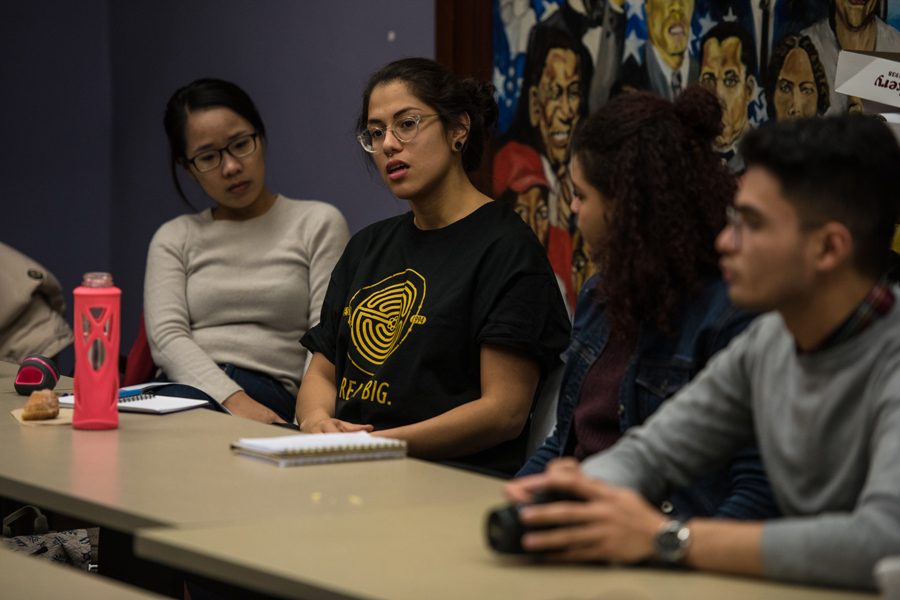Quest Scholars discuss financial barriers, strategies for generating resources
Brian Meng/The Daily Northwestern
Yakira Mirabito speaks to a group of peers at a Quest Scholars Network town hall Thursday. Mirabito said students can generate resources if they voice their concerns regarding financial barriers.
February 2, 2018
As co-president of the Quest Scholars Network, Yakira Mirabito says her access to University officials can generate concrete resources if students voice concerns.
“We can get stuff done as the (executive) board,” the McCormick fifth-year said at a Thursday town hall. “We definitely can take all of your thoughts and considerations and make it a reality.”
Mirabito began the discussion at the Black House — which was open to all low-income and first-generation students, as well as their allies — by listing programs created after students shared the financial barriers they’ve encountered as low-income students, including the Student Activity Scholarship and Student Emergency and Essential Needs Funds. About 15 students discussed those obstacles and potential strategies to get the broader Northwestern community involved.
To overcome these barriers, students suggested they ask professors for assistance, appeal financial aid decisions and attend an upcoming Community Dialogue to advocate for their interests.
Among students’ concerns was the administration’s perceived lack of public support for initiatives to aid low-income students. Madisen Hursey, vice president of Quest, said University officials should communicate their support with comparable publicity to their stance against sexual violence.
“If the University demonstrates that they care about the issue … and take these definitive actions,” the Weinberg junior said, “then the larger campus can see this is a value that the campus as a whole, demonstrated by these representatives of the University, (upholds).”
Hursey also said it’s important students know who in the administration is taking concrete action, noting students’ lack of awareness regarding Provost Jonathan Holloway’s approval of a textbook assistance program last fall. Hursey criticized University President Morton Schapiro’s previous comments that it “doesn’t matter who gets the credit” as long as something “right” is done.
“It does matter that we know,” Hursey said. “We have to be able to point to someone and say, ‘We are supported by these people and maybe not these other ones.’ It definitely matters where it comes from.”
Additionally, students brainstormed ideas to get the rest of the school community involved, particularly wealthier students who may be unaware of the obstacles low-income students face. Mirabito said resources for low-income students benefit everyone, saying students who receive assistance from the Student Activity Scholarship Fund, for example, are “more involved as a leader of their team and a teammate.”
Even so, some students criticized Northwestern’s diversity and inclusion initiatives, saying the University focuses more on advertising its diverse students than actually fostering inclusion and support for them.
“When it comes to upholding organizations like Quest or SES that are all about inclusion, which is different from diversity, they just shy away from it,” SESP junior Christian Reyes said. “I feel like if we’re just built into the narrative, that could really shift the way people see us — or even see us in the first place.”
Reyes, a Quest Scholar, told The Daily the conversation about low-income students often ends with the University’s goal of 20 percent Pell Grant-eligible students by 2020.
“All (University officials) are doing is promoting an image for Northwestern so that they can look good for the rest of the world,” he said.
Email: [email protected]
Twitter: @_perezalan_


